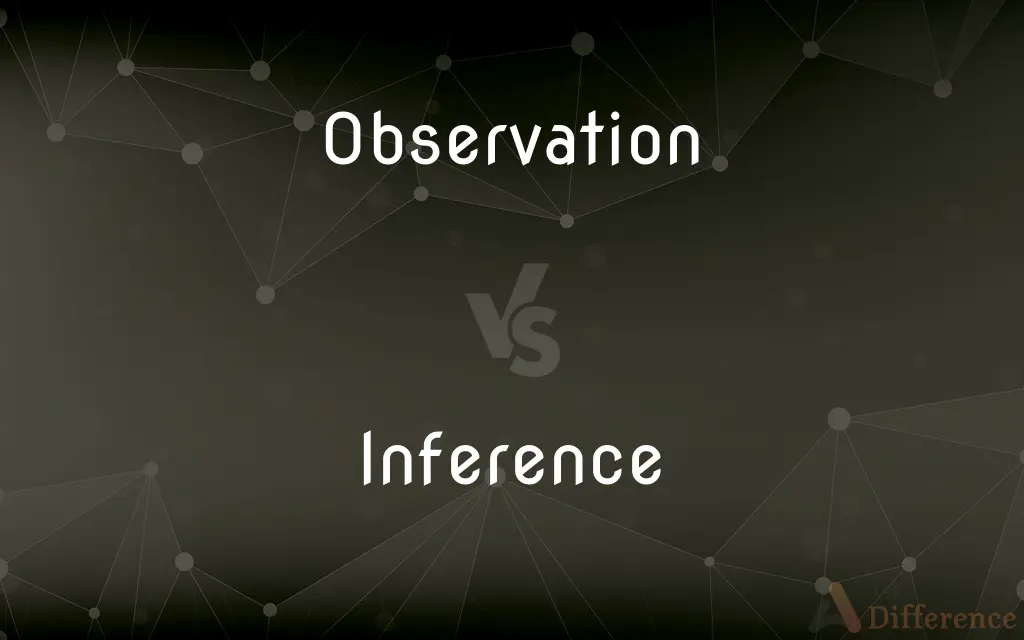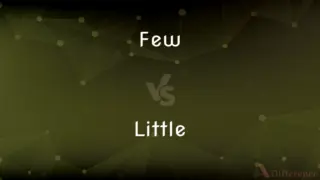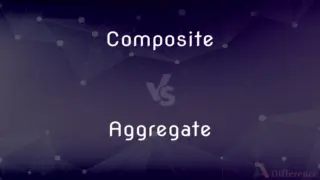Observation vs. Inference — What's the Difference?
By Tayyaba Rehman & Maham Liaqat — Updated on April 16, 2024
Observation refers to collecting data through sensory experiences or instruments; inference involves deriving conclusions from observations.

Difference Between Observation and Inference
Table of Contents
ADVERTISEMENT
Key Differences
Observation is the act of noticing and recording specific details about a phenomenon using senses or scientific tools, ensuring objective data collection. On the other hand, inference is a cognitive process where one interprets those observations and makes conclusions or predictions based on them.
Observations are factual, quantifiable, and often unambiguous, forming the fundamental data that can be verified by others. Whereas inferences, being subjective interpretations, are influenced by an individual's past experiences and knowledge, making them less universally agreeable.
In the scientific method, observations are used to generate hypotheses. Conversely, inferences are used to establish a theory or law based on the patterns recognized in the observed data.
Observation can occur without necessarily leading to an inference, as it might just involve data collection. In contrast, inferences cannot be made without prior observations to base them on, highlighting a dependency relationship.
Observations often answer the 'what', 'when', 'where', and 'how' of phenomena, providing clear, direct information. Inferences, however, attempt to answer the 'why', which introduces potential biases or errors based on the observer's interpretation.
ADVERTISEMENT
Comparison Chart
XDefinition
Direct method of gathering data
Logical interpretation of data
Dependency
Can exist without inference
Requires observation to exist
Nature
Objective and factual
Subjective and interpretative
Outcome
Data collection
Conclusions and theories
Key Questions Answered
What, where, when, how
Why
Compare with Definitions
Observation
A remark, statement, or comment based on something one has seen, heard, or noticed.
He mentioned an interesting observation about her artwork.
Inference
A conclusion reached on the basis of evidence and reasoning.
The inference drawn from the data was controversial.
Observation
The action of closely monitoring something or someone.
She made an observation of the bird's behavior.
Inference
Logical deductions or hypotheses developed from observations.
The experiment led to several important inferences.
Observation
The collection of data through direct exposure to phenomena.
The scientist's observation of the chemical reaction was meticulous.
Inference
An educated guess based on prior knowledge and observations.
His inference was based on years of study in the field.
Observation
An act of noting and recording something scientifically.
His observations were crucial for the research.
Inference
The process of drawing conclusions from facts or premises.
From her silence, he made an inference about her mood.
Observation
The capability to notice things, especially significant details.
Her keen observation helped solve the case.
Inference
The act of interpreting an observed phenomenon.
Her inference about the economic trends was accurate.
Observation
Observation is the active acquisition of information from a primary source. In living beings, observation employs the senses.
Inference
Inferences are steps in reasoning, moving from premises to logical consequences; etymologically, the word infer means to "carry forward". Inference is theoretically traditionally divided into deduction and induction, a distinction that in Europe dates at least to Aristotle (300s BCE).
Observation
The act of observing
Observations of a rare bird.
Inference
A conclusion reached on the basis of evidence and reasoning
It seemed a fair inference that such books would be grouped together
Researchers are entrusted with drawing inferences from the data
Observation
The power or faculty of observing.
Inference
The act or process of deriving logical conclusions from premises known or assumed to be true.
Observation
The fact of being observed
Kept the suspect under observation.
Inference
The act of reasoning from factual knowledge or evidence.
Observation
The act or process of perceiving something, such as a phenomenon, often by means of an instrument, and making a record of the resulting information.
Inference
Something inferred.
Observation
The result or record of such an act or process
A meteorological observation.
Inference
Usage Problem A hint or suggestion
The editorial contained an inference of foul play in the awarding of the contract. See Usage Note at infer.
Observation
An inference, judgment, or remark that is made by observing
Made some sharp observations about the movie.
Inference
(uncountable) The act or process of inferring by deduction or induction.
Observation
The act of observing, and the fact of being observed (see observance)
Inference
(countable) That which is inferred; a truth or proposition drawn from another which is admitted or supposed to be true; a conclusion; a deduction.
Observation
The act of noting and recording some event; or the record of such noting.
Inference
The act or process of inferring by deduction or induction.
Though it may chance to be right in the conclusions, it is yet unjust and mistaken in the method of inference.
Observation
A remark or comment.
Inference
That which inferred; a truth or proposition drawn from another which is admitted or supposed to be true; a conclusion; a deduction.
These inferences, or conclusions, are the effects of reasoning, and the three propositions, taken all together, are called syllogism, or argument.
Observation
A judgement based on observing.
Inference
The reasoning involved in drawing a conclusion or making a logical judgment on the basis of circumstantial evidence and prior conclusions rather than on the basis of direct observation
Observation
Performance of what is prescribed; adherence in practice; observance.
Observation
A regime under which a subject is routinely observed.
Observation
Philosophically as: the phenomenal presence of human being existence.
Observation
(stochastics) A realization of a random variable.
Observation
The act or the faculty of observing or taking notice; the act of seeing, or of fixing the mind upon, anything.
My observation, which very seldom lies.
Observation
The result of an act, or of acts, of observing; view; reflection; conclusion; judgment.
In matters of human prudence, we shall find the greatest advantage in making wise observations on our conduct.
Observation
An expression of an opinion or judgment upon what one has observed; a remark.
To observations which ourselves we makeWe grow more partial for the observer's sake.
Observation
Performance of what is prescribed; adherence in practice; observance.
We are to procure dispensation or leave to omit the observation of it in such circumstances.
Observation
The act of recognizing and noting some fact or occurrence in nature, as an aurora, a corona, or the structure of an animal.
Observation
The act of making and recording a measurement
Observation
The act of observing; taking a patient look
Observation
Facts learned by observing;
He reported his observations to the mayor
Observation
The act of noticing or paying attention;
He escaped the notice of the police
Observation
A remark expressing careful consideration
Common Curiosities
Can an inference be made without an observation?
No, inferences rely on data or observations as their foundational basis.
Is observation always objective?
Ideally, observations should be objective, but human bias can sometimes play a role.
What is an inference?
Inference is the process of drawing conclusions based on observations and existing knowledge.
How does observation differ from inference in scientific research?
Observations are data collected through direct interaction, while inferences are conclusions drawn from this data.
What is an example of observation in daily life?
Noting that it is raining outside is an observation.
Why are observations important in the scientific method?
They provide the factual basis from which scientific hypotheses are formed.
How does one ensure observations are accurate?
By using reliable tools and methods, and often by repeating the observation process.
What is an observation?
Observation is the act of noting and recording something using senses or scientific tools.
What is an example of inference in daily life?
Concluding that it will rain soon because the sky is dark is an inference.
Can observations be proven wrong?
Yes, further observations can disprove previous observations.
Can inferences be proven wrong?
Yes, as they are interpretations, they can be corrected with more accurate information.
How do observations and inferences work together in the scientific method?
Observations provide the data needed to make inferences and build theories.
What tools are used to make observations?
Tools like microscopes, telescopes, and cameras are often used to aid observations.
How can biases affect inferences?
Biases can influence how data is interpreted, leading to skewed or incorrect conclusions.
What role does reasoning play in making inferences?
Reasoning connects the dots between observations and conclusions, using logic to interpret data.
Share Your Discovery

Previous Comparison
Few vs. Little
Next Comparison
Composite vs. AggregateAuthor Spotlight
Written by
Tayyaba RehmanTayyaba Rehman is a distinguished writer, currently serving as a primary contributor to askdifference.com. As a researcher in semantics and etymology, Tayyaba's passion for the complexity of languages and their distinctions has found a perfect home on the platform. Tayyaba delves into the intricacies of language, distinguishing between commonly confused words and phrases, thereby providing clarity for readers worldwide.
Co-written by
Maham Liaqat












































